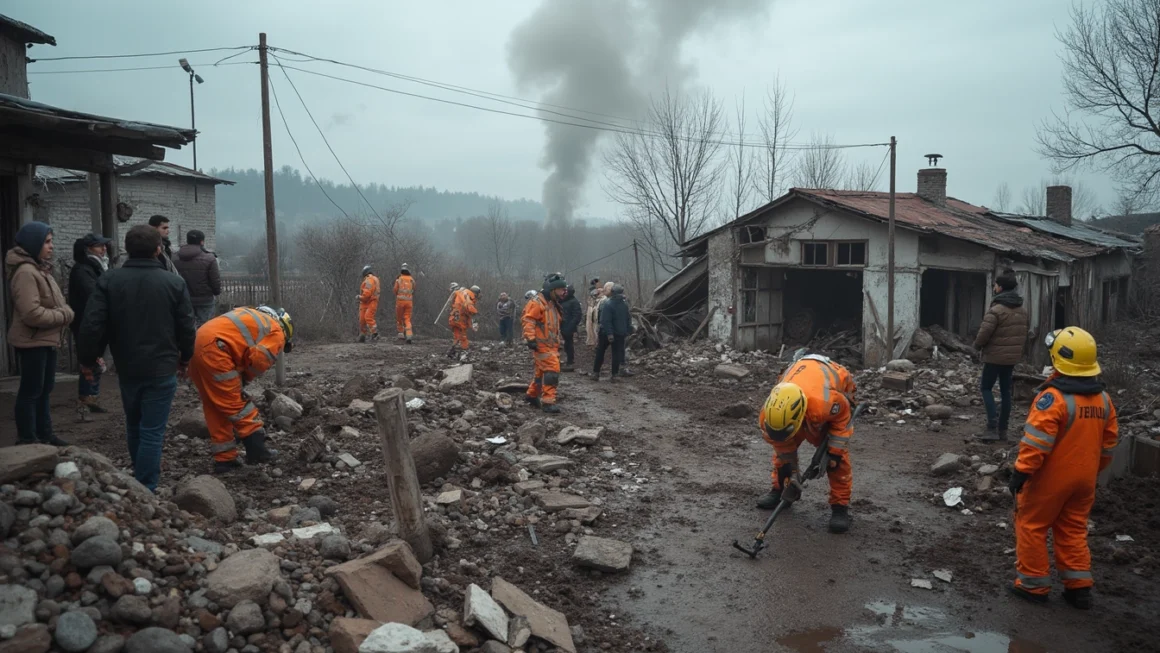The ongoing conflict in Ukraine has taken a tragic turn with a devastating missile strike on a café and shop in the village of Hroza, located in the northeastern Kharkiv region. This attack, which occurred on Thursday, has resulted in the loss of at least 51 lives, marking one of the deadliest single attacks on civilians since Russia’s invasion began in February 2022.
The Devastating Impact
Table of Contents
The missile strike targeted a gathering of locals who had come together to commemorate a fallen Ukrainian soldier. The timing and location of the attack have raised questions about the deliberate nature of the assault on civilians. Ukrainian President Volodymyr Zelensky condemned the attack, emphasizing the innocence of the victims and the brutality of the act.
Rescue efforts are ongoing, with emergency services working tirelessly to search for survivors and recover bodies from the rubble. The scale of destruction has shocked the local community and drawn international attention to the continued suffering of Ukrainian civilians caught in the crossfire of this prolonged conflict.
International Response and Investigations
The international community has responded with outrage and calls for accountability. The United Nations has expressed deep concern over the attack, with spokesperson Stephane Dujarric stating that targeting civilians and civilian infrastructure is prohibited under international humanitarian law.
Investigations into the attack are underway, with Ukrainian authorities working to gather evidence and determine the exact nature of the weapon used. Initial reports suggest the use of an Iskander ballistic missile, a powerful weapon in Russia’s arsenal.
The Broader Context of the Conflict
This attack comes at a time when Ukraine is facing increasing challenges in its counteroffensive against Russian forces. The slow progress and mounting casualties have raised concerns about the long-term sustainability of Ukraine’s military efforts.
The conflict has also had far-reaching global implications, affecting energy markets, food security, and international diplomacy. The need for a diplomatic solution has never been more apparent, yet the path to peace remains elusive.
Humanitarian Crisis and Aid Efforts
The ongoing conflict has created a significant humanitarian crisis in Ukraine, with millions displaced and in need of assistance. International aid organizations continue to work in challenging conditions to provide support to affected communities.
In light of recent events, there’s an increased focus on the need for more robust civilian protection measures and humanitarian corridors. The international community is being called upon to step up efforts to provide aid and support to those affected by the conflict.
The Role of Technology in Modern Warfare
The use of advanced missile systems in this conflict highlights the evolving nature of modern warfare. The precision and destructive power of these weapons pose new challenges for civilian protection and military strategy. As conflicts become increasingly technologically driven, there’s a growing need for international regulations and agreements to mitigate the impact on civilian populations.
Interestingly, the role of automation in conflict monitoring and response is becoming more prominent. Tools like advanced automation platforms are being utilized to analyze data, track movements, and even coordinate humanitarian efforts in conflict zones.
Looking Ahead: The Path to Peace and Reconstruction
As the conflict in Ukraine continues, the international community faces the dual challenge of working towards a peaceful resolution while also planning for the eventual reconstruction of affected areas. The scale of destruction and loss of life underscore the urgency of finding a diplomatic solution to end the hostilities.
The road to peace will require sustained international engagement, support for Ukraine’s sovereignty, and a commitment to addressing the root causes of the conflict. As discussions continue at the diplomatic level, the immediate focus remains on protecting civilians and providing humanitarian assistance to those in need.
The Role of International Law and Justice
The attack on Hroza has once again brought attention to the importance of upholding international law and ensuring accountability for war crimes. There are growing calls for investigations into alleged violations of international humanitarian law and for those responsible to be brought to justice.
The International Criminal Court and other international bodies have a crucial role to play in documenting and prosecuting war crimes. These efforts are essential not only for achieving justice for the victims but also for deterring future atrocities and upholding the principles of international law.
Conclusion
The missile strike on Hroza serves as a stark reminder of the human cost of the ongoing conflict in Ukraine. As the international community grapples with the implications of this tragedy, the need for a swift and peaceful resolution to the conflict has never been more apparent. The loss of innocent lives underscores the urgency of diplomatic efforts and the importance of upholding international humanitarian law.
As we reflect on this tragic event, it’s crucial to remember the human stories behind the statistics and to work towards a future where such atrocities are prevented. The path to peace may be challenging, but it remains the only viable solution to end the suffering and build a stable, prosperous future for Ukraine and the broader region.




